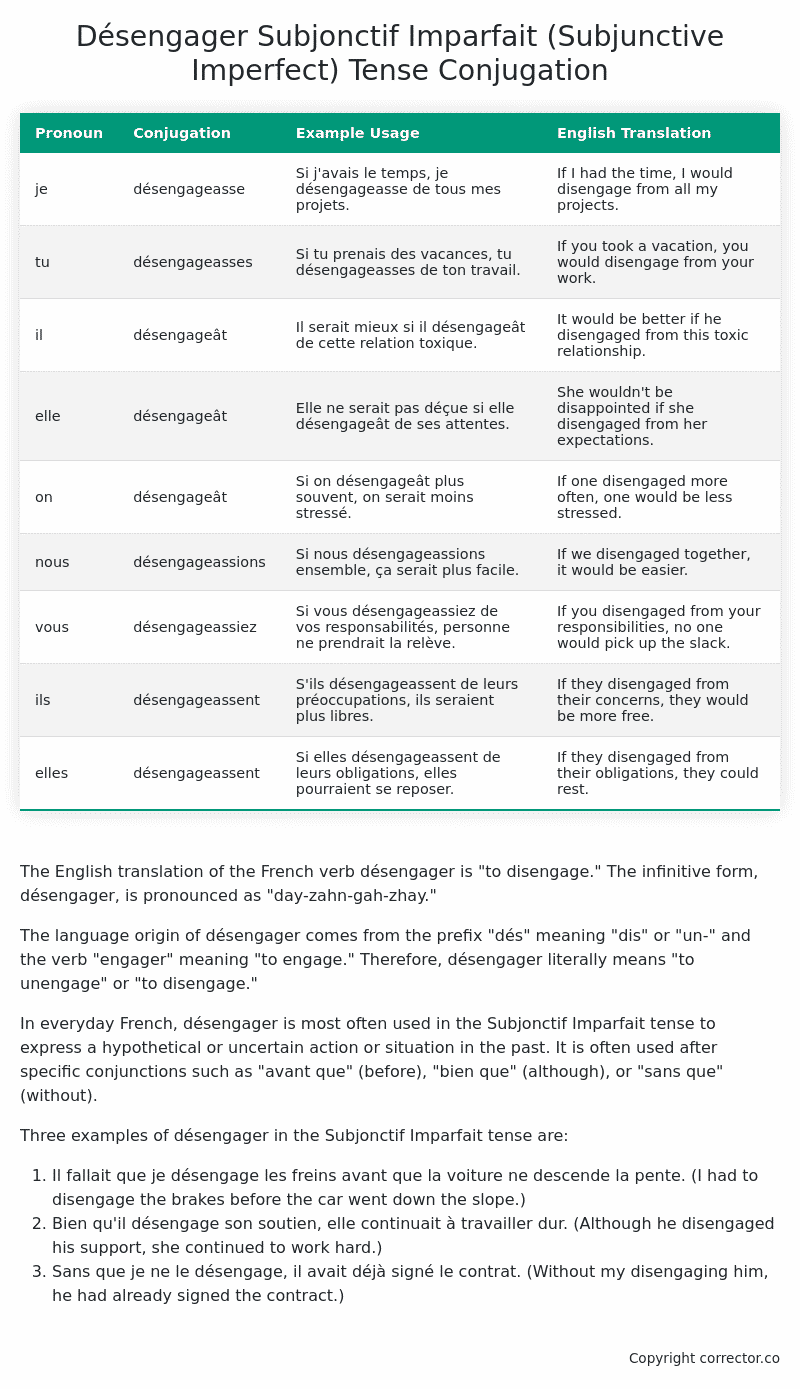Subjonctif Imparfait (Subjunctive Imperfect) Tense Conjugation of the French Verb désengager
Introduction to the verb désengager
The English translation of the French verb désengager is “to disengage.” The infinitive form, désengager, is pronounced as “day-zahn-gah-zhay.”
The language origin of désengager comes from the prefix “dés” meaning “dis” or “un-” and the verb “engager” meaning “to engage.” Therefore, désengager literally means “to unengage” or “to disengage.”
In everyday French, désengager is most often used in the Subjonctif Imparfait tense to express a hypothetical or uncertain action or situation in the past. It is often used after specific conjunctions such as “avant que” (before), “bien que” (although), or “sans que” (without).
Three examples of désengager in the Subjonctif Imparfait tense are:
- Il fallait que je désengage les freins avant que la voiture ne descende la pente. (I had to disengage the brakes before the car went down the slope.)
- Bien qu’il désengage son soutien, elle continuait à travailler dur. (Although he disengaged his support, she continued to work hard.)
- Sans que je ne le désengage, il avait déjà signé le contrat. (Without my disengaging him, he had already signed the contract.)
Table of the Subjonctif Imparfait (Subjunctive Imperfect) Tense Conjugation of désengager
| Pronoun | Conjugation | Example Usage | English Translation |
|---|---|---|---|
| je | désengageasse | Si j’avais le temps, je désengageasse de tous mes projets. | If I had the time, I would disengage from all my projects. |
| tu | désengageasses | Si tu prenais des vacances, tu désengageasses de ton travail. | If you took a vacation, you would disengage from your work. |
| il | désengageât | Il serait mieux si il désengageât de cette relation toxique. | It would be better if he disengaged from this toxic relationship. |
| elle | désengageât | Elle ne serait pas déçue si elle désengageât de ses attentes. | She wouldn’t be disappointed if she disengaged from her expectations. |
| on | désengageât | Si on désengageât plus souvent, on serait moins stressé. | If one disengaged more often, one would be less stressed. |
| nous | désengageassions | Si nous désengageassions ensemble, ça serait plus facile. | If we disengaged together, it would be easier. |
| vous | désengageassiez | Si vous désengageassiez de vos responsabilités, personne ne prendrait la relève. | If you disengaged from your responsibilities, no one would pick up the slack. |
| ils | désengageassent | S’ils désengageassent de leurs préoccupations, ils seraient plus libres. | If they disengaged from their concerns, they would be more free. |
| elles | désengageassent | Si elles désengageassent de leurs obligations, elles pourraient se reposer. | If they disengaged from their obligations, they could rest. |
Other Conjugations for Désengager.
Le Present (Present Tense) Conjugation of the French Verb désengager
Imparfait (Imperfect) Tense Conjugation of the French Verb désengager
Passé Simple (Simple Past) Tense Conjugation of the French Verb désengager
Passé Composé (Present Perfect) Tense Conjugation of the French Verb désengager
Futur Simple (Simple Future) Tense Conjugation of the French Verb désengager
Futur Proche (Near Future) Tense Conjugation of the French Verb désengager
Plus-que-parfait (Pluperfect) Tense Conjugation of the French Verb désengager
Passé Antérieur (Past Anterior) Tense Conjugation of the French Verb désengager
Futur Antérieur (Future Anterior) Tense Conjugation of the French Verb désengager
Subjonctif Présent (Subjunctive Present) Tense Conjugation of the French Verb désengager
Subjonctif Passé (Subjunctive Past) Tense Conjugation of the French Verb désengager
Subjonctif Imparfait (Subjunctive Imperfect) Tense Conjugation of the French Verb désengager (this article)
Subjonctif Plus-que-parfait (Subjunctive Pluperfect) Tense Conjugation of the French Verb désengager
Conditionnel Présent (Conditional Present) Tense Conjugation of the French Verb désengager
Conditionnel Passé (Conditional Past) Tense Conjugation of the French Verb désengager
L’impératif Présent (Imperative Present) Tense Conjugation of the French Verb désengager
L’infinitif Présent (Infinitive Present) Tense Conjugation of the French Verb désengager
Struggling with French verbs or the language in general? Why not use our free French Grammar Checker – no registration required!
Get a FREE Download Study Sheet of this Conjugation 🔥
Simply right click the image below, click “save image” and get your free reference for the désengager Subjonctif Imparfait tense conjugation!

Désengager – About the French Subjonctif Imparfait (Subjunctive Imperfect) Tense
Formation
Common Everyday Usage Patterns
Interactions with Other Tenses
Subjonctif Présent
Indicatif Passé Composé
Conditional
Conditional Perfect
Summary
I hope you enjoyed this article on the verb désengager. Still in a learning mood? Check out another TOTALLY random French verb conjugation!


